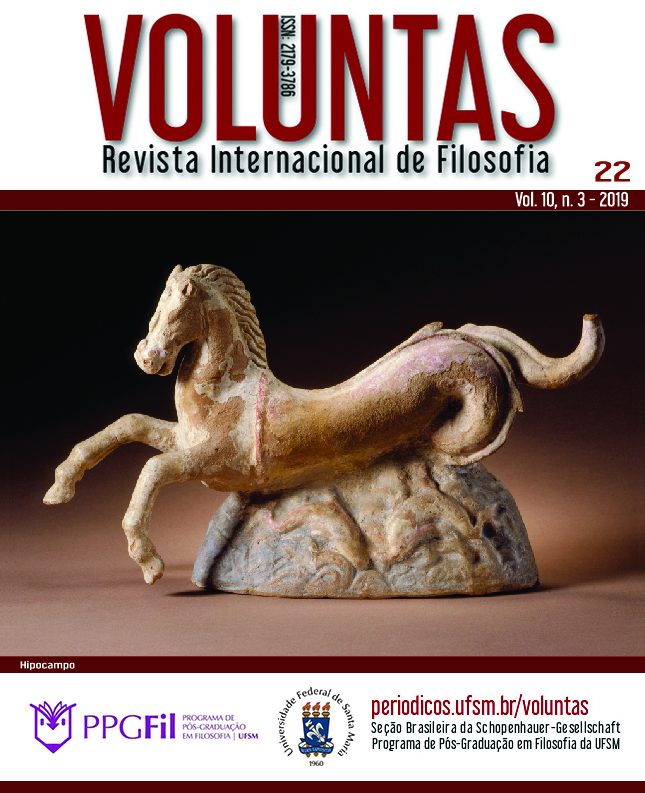Paul Ricœur on collective memory: the cohesion of social life
DOI:
https://doi.org/10.5902/2179378639936Palabras clave:
Collective memory, Remembering, Narrative, History, Social-phenomenologyResumen
The aim of this article is to present a critical reconstruction of Ricœur’s analysis of the complex phenomenon of memory as a collective act of recollection. By focusing the attention on memory as a collective practice, through the use of resources drawn from phenomenology, sociology, and history, I seek to outline the role and the construction of the collective memorial discourse and its foundations, looking particularly at the eighth chapter of the third volume of Time and Narrative and at the work Memory, History, Forgetting. I will show that the identification and the location of ourselves with others in social collectivities imply to negotiate a gap between subjective and cosmic time. Temporality comes, then, in the plural: our being in time is not merely personal, but rather we are originally involved in a social and historical framework.
Descargas
Citas
BARASH, Jeffrey Andrew. The Politics of Memory. In: M. Dooley and R. Kearney (Eds.). Questioning Ethics: Contemporary Debates in Continental Philosophy. London: Routledge, pp. 33-34, 1999.
BARASH, Jeffrey Andrew. The Place of Remembrance. In: B. Treanor and H. I. Venema (Eds.). A Passion for the Possible: Thinking with Paul Ricœur. New York: Fordham University Press, pp. 147-157, 2010.
BARASH, Jeffrey Andrew. Collective Memory and the Historical Past. Chicago: Chicago University Press, 2016.
BARASH, Jeffrey Andrew. The Time of Collective Memory. Études Ricœuriennes/Ricœur Studies, v. 10, n. 1, 2019, pp. 102-111.
BEVAN, Robert. The Destruction of Memory: Architecture at War. London: Reaktion Books, 2006.
HALBWACHS, Maurice. On Collective Memory. Chicago: Chicago University Press, 1992.
HELENIUS, Timo. Ricœur, Culture, and Recognition: A Hermeneutic of Cultural Subjectivity. London: Lexington, 2016.
KEARNEY, R. Narrative Imagination: between Ethics and Poetics. In: R. Kearney (Ed.). The Hermeneutics of Action. London: Sage, pp. 173-190, 1996.
KLEMM, D. Philosophy and Kerygma. Ricœur as Reader of the Bible. In: D. Kaplan (Ed.). Reading Ricœur. New York: State University of New York Press, pp. 47-70, 2008.
LOCKE, John. An Essay Concerning Human Understanding (1689). London: Dent, 1976.
MICHEL, Johann. Introduction to Mémoires et Histoires. Des identités personnelles aux politiques de reconnaissance. Rennes : Presses Universitaires de Rennes, 2005.
NORA, Pierre. Between Memory and History: Les Lieux de Mémoire. Representations, Special Issue: Memory and Counter-Memory, v. 26, n. 1, 1989, pp. 7-25.
PELLAUER, David. Ricœur: A Guide for the Perplexed. London: Continuum, 2007.
RICŒUR, Paul. Time and Narrative, vol. 1. Chicago: Chicago University Press, 1984.
RICŒUR, Paul. Time and Narrative, vol. 3. Chicago: Chicago University Press, 1988.
RICŒUR, Paul. Oneself as Another. Chicago: Chicago University Press, 1992.
RICŒUR, Paul. Memory, History, Forgetting. Chicago: Chicago University Press, 2004.
RICŒUR, Paul. The Course of Recognition. Cambridge: Harvard University Press, 2005.
Descargas
Publicado
Cómo citar
Número
Sección
Licencia
La sumisión de los originales para este periódico implica la transferencia, por parte de autores, de los derechos de publicación impresa y digital. Los derechos autorales para los artículos publicados son del autor, con derechos del periódico sobre la primera publicación. Los autores sólo podrán utilizar los mismos resultados en otras publicaciones indicando claramente este periódico como el medio de publicación original. En virtud de ser un periódico de acceso abierto, está permitido el uso gratuito de los artículos en aplicaciones educacionales, científicas, no comerciales, desde que referenciada la fuente (por favor, vea la licencia Creative Commons en el pie de página de este periódico).






